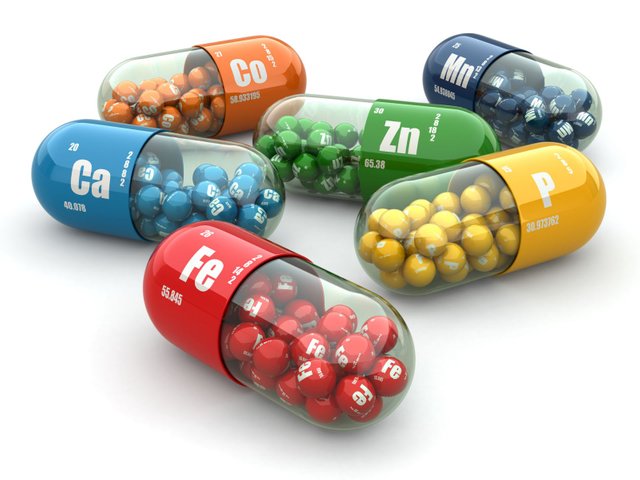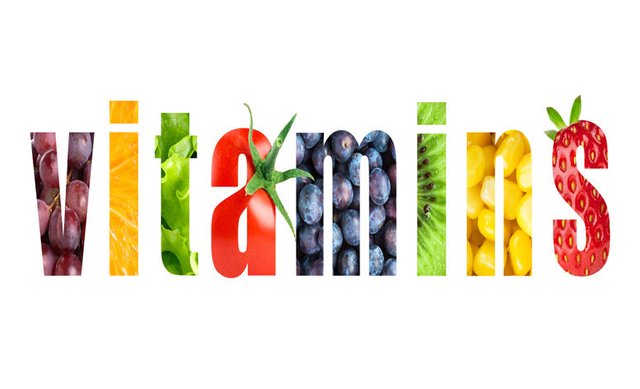


Vitamins are a group of substances that are needed for normal cell function, growth, and development.
There are 13 essential vitamins. This means that these vitamins are required for the body to work properly. They are:
Vitamin A
Vitamin C
Vitamin D
Vitamin E
Vitamin K
Vitamin B1 (thiamine)
Vitamin B2 (riboflavin)
Vitamin B3 (niacin)
Pantothenic acid (B5)
Biotin (B7)
Vitamin B6
Vitamin B12 (cyanocobalamin)
Folate (folic acid and B9)
Vitamins are grouped into two categories:
Fat-soluble vitamins are stored in the body's fatty tissue. The four fat-soluble vitamins are vitamins A, D, E, and K. These vitamins are absorbed more easily by the body in the presence of dietary fat.
There are nine water-soluble vitamins. The body must use water-soluble vitamins right away. Any leftover water-soluble vitamins leave the body through the urine. Vitamin B12 is the only water-soluble vitamin that can be stored in the liver for many years.
Function
Each of the vitamins listed below has an important job in the body. A vitamin deficiency occurs when you do not get enough of a certain vitamin. Vitamin deficiency can cause health problems.
Not eating enough fruits, vegetables, beans, lentils, whole grains and fortified dairy foods may increase your risk for health problems, including heart disease, cancer, and poor bone health (osteoporosis).
Vitamin A :
helps form and maintain healthy teeth, bones, soft tissue, mucus membranes, and skin.
Vitamin B6 :
is also called pyridoxine. Vitamin B6 helps form red blood cells and maintain brain function. This vitamin also plays an important role in the proteins that are part of many chemical reactions in the body. The more protein you eat the more pyridoxine your body requires.
Vitamin B12, like the other B vitamins:
is important for metabolism. It also helps form red blood cells and maintain the central nervous system.
Vitamin C:
also called ascorbic acid, is an antioxidant that promotes healthy teeth and gums. It helps the body absorb iron and maintain healthy tissue. It also promotes wound healing.
Vitamin D:
is also known as the "sunshine vitamin," since it is made by the body after being in the sun. Ten to 15 minutes of sunshine 3 times a week is enough to produce the body's requirement of vitamin D for most people at most latitudes. People who do not live in sunny places may not make enough vitamin D. It is very hard to get enough vitamin D from food sources alone. Vitamin D helps the body absorb calcium. You need calcium for the normal development and maintenance of healthy teeth and bones. It also helps maintain proper blood levels of calcium and phosphorus.
Vitamin E :
is an antioxidant also known as tocopherol. It helps the body form red blood cells and use vitamin K.
Vitamin K :
is not listed among the essential vitamins, but without it blood would not stick together (coagulate). Some studies suggest that it is important for bone health.
Biotin :
is essential for the metabolism of proteins and carbohydrates, and in the production of hormones and cholesterol.
Niacin :
is a B vitamin that helps maintain healthy skin and nerves. It also has cholesterol-lowering effects at higher doses.
Folate :
works with vitamin B12 to help form red blood cells. It is needed for the production of DNA, which controls tissue growth and cell function. Any woman who is pregnant should be sure to get enough folate. Low levels of folate are linked to birth defects such as spina bifida. Many foods are now fortified with folic acid.
Pantothenic acid :
is essential for the metabolism of food. It also plays a role in the production of hormones and cholesterol.
Riboflavin (vitamin B2) :
works with the other B vitamins. It is important for body growth and the production of red blood cells.
Thiamine (vitamin B1) :
helps the body cells change carbohydrates into energy. Getting enough carbohydrates is very important during pregnancy and breastfeeding. It is also essential for heart function and healthy nerve cells.
((Next post will mention the sources of these vitamins))
A very useful article thank you for it, waiting for your new.
Downvoting a post can decrease pending rewards and make it less visible. Common reasons:
Submit
A very useful
Article thank you for it,
Waiting for your new.
- majed1
I'm a bot. I detect haiku.
Downvoting a post can decrease pending rewards and make it less visible. Common reasons:
Submit